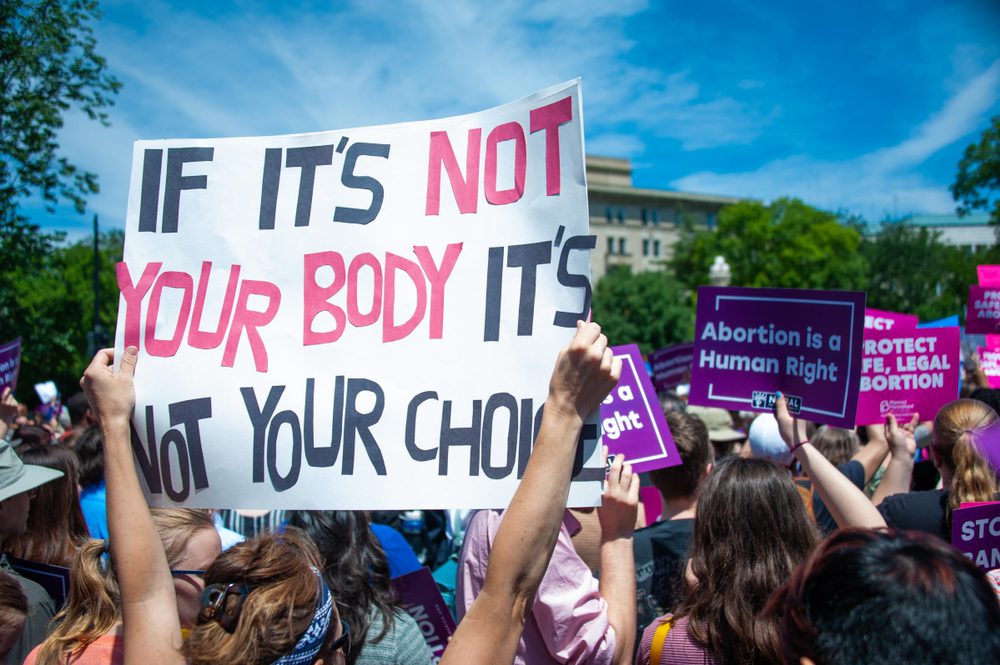The Georgia Supreme Court has reinstated the state’s six-week abortion ban, marking a significant shift in the ongoing legal battle over reproductive rights. This decision, effective immediately, means most abortions will once again be illegal in Georgia after six weeks of pregnancy.
The controversial LIFE Act, signed into law by Republican Gov. Brian Kemp in 2019, prohibits abortion care once fetal cardiac activity is detected. This can occur as early as six weeks, often before many women realize they’re pregnant. While the law includes exceptions for certain circumstances, it remains a contentious issue among reproductive rights advocates.
The legal landscape surrounding abortion in Georgia has been tumultuous. Just last week, a Fulton County judge struck down the six-week ban, allowing abortions to resume up to 22 weeks of pregnancy. Judge Robert McBurney emphasized that the right to liberty in Georgia encompasses a woman’s ability to control her own body and make health care decisions without state interference.
The Supreme Court’s reinstatement of the ban is likely to create further uncertainty regarding access to abortion care in a state that has become a key battleground for reproductive rights. This issue has gained heightened visibility, particularly among Democratic candidates and activists who are prioritizing reproductive health in their campaigns.
Among the most poignant examples of the law’s impact are the cases of Amber Nicole Thurman and Candi Miller, two Black women who died in 2022 after complications from taking abortion pills. Their stories, highlighted by Vice President Kamala Harris during her campaign, underscore the real-life consequences of restrictive abortion laws. Reports indicate that Miller, who had pre-existing health issues, was hesitant to seek medical help due to the law, while Thurman faced a lengthy hospitalization before doctors felt they could legally intervene.
The response from reproductive rights advocates has been swift and critical. Kwajelyn Jackson, executive director of the Feminist Women’s Health Center, condemned the ruling, stating, “It is cruel that our patients’ ability to access the reproductive health care they need has been taken away yet again. This ban has wreaked havoc on Georgians’ lives, and our patients deserve better.”
Jaylen Black, a spokesperson for Planned Parenthood Southeast, described the ruling as an egregious example of how far anti-abortion lawmakers will go to strip Georgians of their fundamental rights. He pointed out that the ban has already resulted in preventable deaths and will continue to harm individuals seeking reproductive care.
As the Georgia Supreme Court reviews the appeal, the future of abortion access in the state remains uncertain. The ongoing legal battles reflect a broader national conversation about reproductive rights and the implications of restrictive laws on women’s health. Advocates for reproductive justice continue to rally for the rights of women to make informed choices about their bodies and healthcare.
The reinstatement of the six-week ban highlights several key issues:
Legal Whiplash: The rapid transition from the Fulton County judge’s ruling to the Supreme Court’s reinstatement illustrates the volatile nature of abortion law in the post-Roe era. This legal back-and-forth creates uncertainty for both patients and health care providers.
Timing of the ban: The six-week mark is particularly controversial because many women are unaware of their pregnancies at this early stage. This effectively makes the law a near-total ban on abortions for many women.
Impact on health care: The cases of Thurman and Miller underscore the potential health risks associated with restrictive abortion laws. Their stories highlight how such laws can deter women from seeking necessary medical care, even in emergencies.
Racial disparities: The fact that both Thurman and Miller were Black women points to the disproportionate impact these laws can have on women of color, who often face additional barriers to health care access.
Political implications: This issue has become a focal point for Democratic candidates and activists, suggesting it will play a significant role in upcoming elections and political discourse.
Health care provider challenges: The reinstated ban puts health care providers in a difficult position, potentially forcing them to delay or deny care due to legal concerns.
Ongoing legal battle: The Georgia Supreme Court’s decision is not final, as they are still reviewing the appeal. This leaves open the possibility of further changes to the law’s status.
National context: Georgia’s situation reflects a broader national trend of states grappling with abortion laws in the wake of the U.S. Supreme Court’s reversal of Roe v. Wade.
The situation in Georgia exemplifies the complex and contentious nature of abortion legislation in the United States. It highlights the intersection of law, health care, politics and individual rights, demonstrating how changes in abortion law can have immediate and significant impacts on people’s lives.
As the legal process continues, it’s likely that Georgia will remain a key battleground in the national debate over reproductive rights. The ongoing struggle between those seeking to protect access to abortion and those aiming to restrict it reflects deeper societal divisions and differing interpretations of personal freedom, health care rights and the role of government in private medical decisions.
For now, women in Georgia face a new reality, one where their reproductive choices are once again severely limited. As the courts continue to grapple with these complex issues, the lives and health of countless individuals hang in the balance, underscoring the profound human impact of these legal and political battles.




